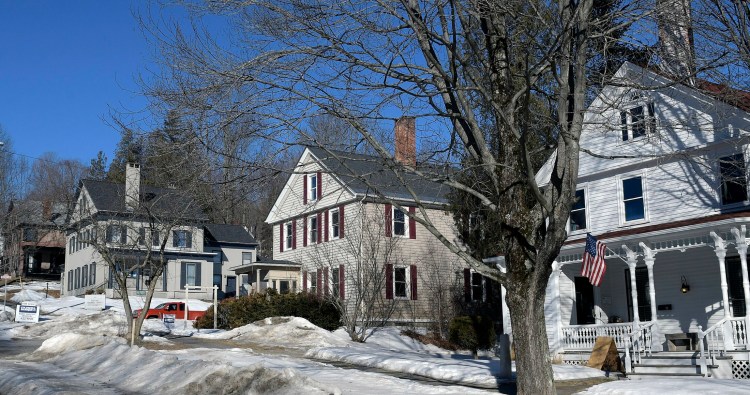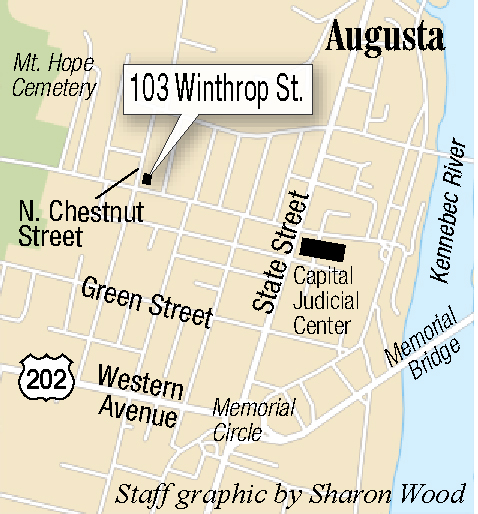AUGUSTA — After almost four hours of often passionate testimony about a plan for a substance abuse and mental health counseling agency in the west side neighborhood, Planning Board members were left unable to decide.
So late Tuesday night they tabled Blue Willow Counseling’s proposal to open a counseling services business at 103 Winthrop St. in Augusta until March 12.
The issue has pitted residents who want the area to be a mostly residential neighborhood of homes against advocates for mental health treatment and recovering addicts. Those opposed to the plan say they want to bring it back to a quieter neighborhood of historic homes. Those in favor credit the counseling agency with helping get people with mental health and substance abuse challenges off the streets, and argue they should be allowed to help people in the now-vacant Winthrop Street building, which was built in 1856.
They did have common ground — the approximately 40 people who debated the issue at Augusta City Center late into Tuesday night agreed that counseling services for addicts and people suffering from mental health problems are much needed and that the practice provides them well. The owners of Blue Willow Counseling already have offices in Portland, in Lewiston and in a leased space at 9 Green St. in Augusta about a half-mile away from the proposed new site.
“They’ve done excellent work for us. We definitely can see the impact they’re having on the lives of the people they serve,” said Maeghan Maloney, district attorney for Kennebec and Somerset counties, who lives in the west side neighborhood.
She said Blue Willow has contracts with the criminal justice system to provide counseling services to veterans and people accused of crimes who have substance abuse and/or mental health problems.
“We simply don’t have enough mental health and substance abuse treatment in Maine,” Maloney said. “When I walk to work (in the summer), I walk right by that house; and I’d welcome them to the neighborhood, because I know this is a service we need in this area.”

Jennifer and Brian Wood, the CEO and CFO respectively of Blue Willow Counseling, in the lobby Sunday of the building the firm plans to purchase at 103 Winthrop St. in Augusta.
Their not-so-common ground included parking, traffic, property values and the potential effect the business could have on the neighborhood.
Susan Williams, who lives with her husband, Bruce, at 104 Winthrop St., diagonally across from the proposed counseling site, said hers are indeed “not in my backyard” concerns, but not what some people might think. She’s concerned about parking and increased traffic — vehicle and pedestrian — not with the people in need of counseling who would go to the site. Williams said she hates it when others use the term “those people,” and added that she and her husband volunteer at the local food bank and James’ Place, a local sober house.
“We have insight into the need for services Blue Willow is offering and we applaud these efforts to meet a need that is, sadly, increasing in the community,” Williams said. “We truly see the need for these services and hope they expand, just please in a neighborhood that is better suited for this level of activity.”
Some neighborhood residents did express concerns about addicts coming to the site for medically assisted recovery from drug addiction, after learning some clients of Blue Willow are given suboxone prescriptions. One resident, Cheryl Clukey, worried that people might come to their appointments high.
Deanna Felvey, medical director for Blue Willow, said no suboxone or any other medications would be kept at the site. She said no one with the agency writes prescriptions for methadone, and any other medication prescriptions would be filled at pharmacies, not the office. Felvey also noted she has never had a situation at other offices where police needed to be called to intervene with clients.
Tuesday night’s appearance before the Planning Board was the second for Blue Willow. The proposal was first rejected by the Planning Board in July 2018 for not having enough parking for the planned number of employees. The business scaled back its plan, reducing the number of employees from 12 to five, and resubmitted it.
Jennifer Wood, who with her husband and business partner, Brian, proposes to purchase the homelike building for use as a counseling office, said they’ve had no problems with clients or neighbors at their other offices. She also said concerns about their clients potentially being disruptive to the neighborhood are misplaced. Wood said their clients are everyday people — doctors, lawyers, blue-collar workers and others — looking for help dealing with depression and other mental health problems or help overcoming addictions to drugs or alcohol.
Neighbors of the property who spoke against the proposal said it would bring additional traffic to a neighborhood they’ve worked hard to make — and keep — primarily residential.
Heather Pouliot lives next door to the property in a home she and her husband, Sen. Matt Pouliot, have worked to restore. In noting the work she and others in the neighborhood have done to restore the large homes lining the street, Pouliot said having a busy substance abuse counseling service would reduce the property values of surrounding homes. She said the city’s comprehensive plan indicates the city should seek to return the Winthrop Street area back to its more-residential past, countering the neighborhood’s increase of businesses there in recent years.
While he agreed that Blue Willow’s services are needed to address a nationwide opiate addiction problem, Matt Pouliot said there are many vacant buildings in the city where those services could be offered that would not be as disruptive to a residential neighborhood. He also acknowledged that he offered, in a conversation with Brian Wood, to reimburse the business owners for their expenses incurred so far on the proposal — if they would agree to put it elsewhere.
The property is in the city’s Institutional Business Professional Zone, where social services are a conditional use. Conditional uses in zoning districts generally require a higher level of review of the neighborhood compatibility of a project than permitted uses.
Board members who rejected the proposal unanimously at their July meeting cited worries about the effect of increased traffic it could bring to the Winthrop Street area. Parking remains a major concern about the scaled-back proposal, both among neighbors and Planing Board members.
Scott Upham, of Cribstone Capital Management, which shares a parking lot on North Chestnut Street with 103 Winthrop St., raised questions about a parking easement for the property. He claimed the site didn’t have the 12 parking spaces needed to meet city minimum parking requirements. He and several others said there is no way the two small parking lots to which the 103 Winthrop St. property has an easement provide the number of spaces claimed by the Woods.
Wood said they have since had a survey done and determined they have the 12 spaces needed. The city staff reviewed the proposal and concluded the site has enough parking spaces to meet ordinance requirements.
However, Kristen Collins, an attorney for the city, said board members also may consider, as part of their decision-making process, other standards in the ordinance, such as whether there is room within a parking lot for traffic to circulate safely.
Bill Tisdale, current co-owner of 103 Winthrop St., said he’s owned it since 2006, and his father owned it for 20 years before that. He’s had it on the market for sale since 2012 but thus far has been unable to find a buyer.
The Winthrop Street site would replace Blue Willow’s current site, in leased space on Green Street. Jennifer Wood said they want to own their own building, and the homelike setting of the Winthrop Street building would be a more comforting environment for people coming for counseling. She noted it would not be a residential facility and would not have clients coming at night or on weekends. Wood noted most of their clients don’t have their own cars and would use public transportation to get to the location, so they wouldn’t need space to park.
Wood said a counselor might see five clients in a typical day; with five counselors on site, that could mean 25 clients coming for one-hour appointments daily. They also sometimes offer group counseling sessions with as many as 10 clients, but she said they would never schedule more than one such group session at a time, or back to back.
Among the services Blue Willow offers is Driver Education and Evaluation Program sessions, which drivers convicted of operating under the influence often are required to attend.
Jennifer Wood said their Lewiston site has 13 counselors, without incident and without complaints from neighbors for 17 years.
Planning Board members said they need more information about the parking situation on the property, whether the proposal is being properly reviewed as a conditional use, and more time to think before making a decision.
“We’re just day-to-day citizens trying to do our job. If it was 100 percent black and white, many of our decisions would take just a couple of minutes,” board member Peter Pare said. “But there’s always the human side. If I had to vote tonight, I don’t know that I could come down on either side. I need to be able to make a conscientious, accurate decision, a little bit more information.”
Keith Edwards — 621-5647
kedwards@centralmaine.com
Twitter: @kedwardskj
Send questions/comments to the editors.





Success. Please wait for the page to reload. If the page does not reload within 5 seconds, please refresh the page.
Enter your email and password to access comments.
Hi, to comment on stories you must . This profile is in addition to your subscription and website login.
Already have a commenting profile? .
Invalid username/password.
Please check your email to confirm and complete your registration.
Only subscribers are eligible to post comments. Please subscribe or login first for digital access. Here’s why.
Use the form below to reset your password. When you've submitted your account email, we will send an email with a reset code.